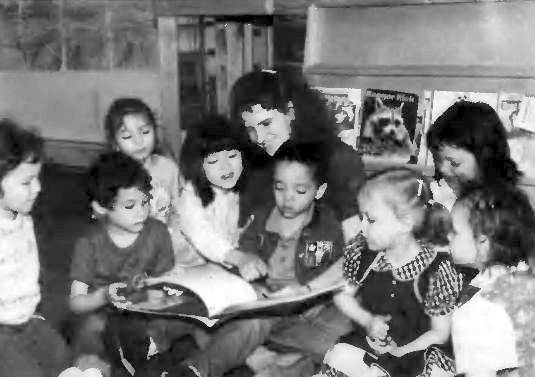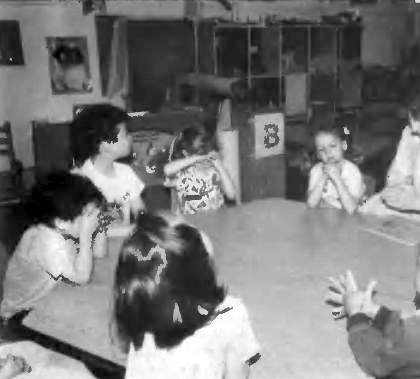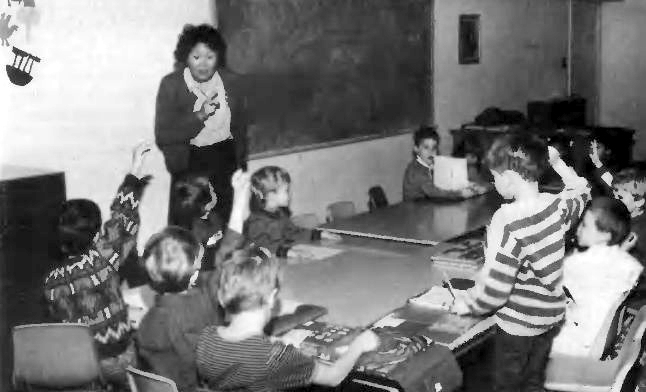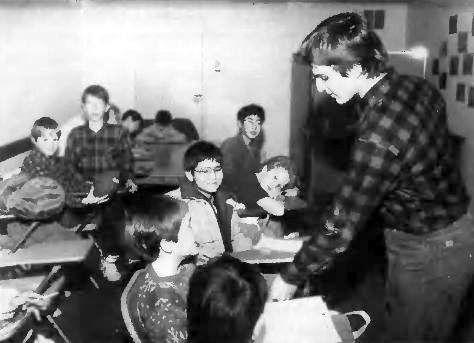![]()
The Words of the Marshall Family
|
|
The Words of the Marshall Family |

Head
teacher Laura Gilallan with Jin-A school children
Question: How did you get started?
Inku: I came here to the Washington, DC area in July 1986; previously my mission was in Germany. While working as a blessed family department counselor here, I realized how important children's education is. So after March 1988 I felt we have to learn Korean and began writing letters and calling people. Margaret Herbers responded and we began humbly with 18 children from six to twelve years old in one big room.
Question: Did you have experience teaching Korean before?
Inku: Actually, I've had a very unique life. I joined the church at the age of 14 in Korea, and when I was 17 Father said we should go to other nations as missionaries. We drew names, and I chose Germany. I started studying the German language and literature at university, and when I graduated Father said, "When you go to Europe, you can teach Korean in Germany." He was so excited but I didn't know why at that time. Then I went to Germany, got my PhD, and started a job teaching at a university. Father came in 1981 and all of a sudden he asked me about working with Seilo. I said, "Father, I never saw machines before and I don't like money -- that is not for me." Father said, "You should do it." So the next day I went to the president of the university and said, "I am quitting my job." He said, "Please think about this again. This is a very serious matter." The next day I began working at Seilo and continued until I came to America in 1986. So I spent about 10 years in Germany, and taught some Korean during that time. While with Seilo, I felt I had been educated for some purpose. I was willing to do anything, but my heart was in the education of children. The result of our life is our children. I want to help them to build a good foundation.

Prayer
time at the Jin-A school.
Question: How do the community and the children respond to the school?
Inku: We sent an application to each family with eligible age children, starting from six years old. They seemed so happy -- that is what they have desperately awaited.
Lisa: Margaret and I have turned out to be her staunchest supporters, because of our serious interest in children's education and spiritual education, so we refer to ourselves as a trinity, who meet religiously every week to go over our schoolwork. Before the advent of this school, my children were studying Korean at a Methodist church school; it was rather expensive, but I was determined that my children would learn Korean. During the CARP condition for the blessed wives I saw at Jacob House they were teaching Korean to the children. I knew instantly, "Of course, our children have to learn Korean." When the condition was finished, I was desperate to continue this instruction and I eventually found one of our Korean blessed teenagers to teach. My young boys were about five and six at that time. After me, other parents started going to the same teenager. It was just a very small beginning, but it was something. Then I started going to an outside Korean Methodist church.
I was so glad when Inku called. At first I was skeptical, because I knew of some projects started by church members that had not been followed through. I was afraid to make a commitment, I could no longer afford the outside tuition so I wanted to give it a try.
We started out with all these children in one big room and at different levels of understanding. The parents would sit in the back and try to study along with the children. As time went by we realized we needed to create different classes according to their abilities. And out of that a very strong bond developed among Margaret, Inku and myself as we met to discuss the curriculum for the coming days. We were very grateful when Stefen was persuaded to teach Wonhwa-do. It would be wonderful to have even more activities with Divine Principle taught to the children as well.
Inku: In the beginning it was very hard for the children to come on Saturday to Korean school, because they have sports and many other activities on Saturday. I still love to remember what this one boy said during my class: "Mrs. Marshall, I have no vacation." I said, "What do you mean?" "From Monday to Friday is normal school and Saturday is Korean school and Sunday I have to go to Sunday school, so I have seven days of school." I laughed, but it is such a true feeling he expressed, I loved it so much. I said, "Yes, you are right, you have no vacation. So maybe if your heart is not here, it is better not to come, and may be do other things." He decided to come. It took time for the children to get used to coming; but now, though we didn't expect it, a special friendship has developed among the students.
Lisa: I think all the parents agree that though they have friends at school and in the neighborhood, our blessed children need to be the best of friends. As they are learning Korean is a wonderful time to develop friendships.
Inku: At first, the parents pushed them, but now, even with no push, they like to come. More than how much they learn, I mind whether they like it or not. If they have a bad experience, in the future they will have difficulty to overcome this feeling. So really, we try to have a joyful time. At first I didn't ask so much study, homework, or achievement. But now, I can push more and they still like to come.
Stefen: Inku and I began working together about a year and a half ago when I asked Nicholas Buscovich, "Is there some possibility that I can teach Wonhwa-do to the kids?" He told me to talk to Inku, and she was so happy, "Oh yes, you can start next week." They had already organized the whole Saturday school, so I followed their schedule. It
is hard for people to learn Wonhwa-do one day a week, but if I don't get frustrated, the kids seem to enjoy it and keep trying.
I told the children that after a while I can tell who likes the class and who doesn't -- the people who like it improve, the people who don't like it don't. The more they learn the basic martial arts the better. One martial arts instructor told me that there are some martial arts that belong to men and some that belong to heaven. I do feel that Wonhwa-do belongs to heaven.
Inku: Though our class has had many interruptions still we are continuing -- and we feel good about that. This spring there were several workshops on Saturdays, and we had to, very unwillingly, close.
Lisa: It is so difficult for the children to learn a foreign language. It is not like learning Spanish or French at school, every day. Here it is just once a week, and even then it is sometimes cancelled. And the children don't usually have the advantage of their parents knowing Korean. That is why we emphasize the importance of parental involvement in the classes. Learning with the children is the best way to learn. If you want your children to progress, you have to learn along with them.
Inku: We are thinking about offering a summer program in Korea to provide an exciting way to experience a real reason to learn Korean. We'd like to have an exchange program but Koreans cannot financially support their children to come hen-. Maybe six or seven children each year would go sightseeing in Korea, tour the church historical sites, the countryside and cities. In that way they would feel connected to Korea and return more motivated and excited to learn Korean.
We have a long summer vacation in America, two and a half months. In Korea they have two weeks. American parents who are working want something valuable for their children over the summer.
Another thing I have tried is pen pals. Korean children cannot write much English, and our children cannot write so much Korean, but somehow it is working. We try to do special things like this to stimulate the children.
Last year I tried to find a Korean teacher from the Korean members here. I couldn't find any Korean person but I found Toby, a second generation blessed child who has been in Korea. He is young and he explains many things about his life in Korea. Though he doesn't teach exactly like the rest of us teachers, he is an example for the children to see. In that way his contribution is great.
Lisa: Occasionally when I am teaching, the older children in Wonhwa-do will come into my class, and I will quickly recruit them to help teach the little ones. The class suddenly becomes quiet, because an older child is there. I hope to instill that sense of responsibility in the minds of the elder children so that they will be inspired to teach the younger children.
Question: What is the possibility of setting up a Saturday Korean school in an area with only a few blessed couples?
Inku: Probably one Korean blessed sister should start. I can help with training and materials -- we did a lot of research here -- but there must be someone from the area committed to following through.

Enthusiastic
students respond to their teacher, Mrs. Marshall.
Question: What kind of a time commitment are you talking about in setting up this kind of school?
Inku: Many people tell me, "Oh, you are Korean, you can teach." But I had to study so much in the beginning and even now I spend much time preparing ways to teach. Margaret and I developed a unique approach to teaching the children the alphabet through puzzles, because this requires eye/hand coordination. Anyone age three and up can put it together, thereby playing and learning. Margaret and I have developed a lot of materials. Most of the books in bookstores are for the Koreans whose parents are Korean.
Margaret: It doesn't need to be Koreans to teach Korean. Especially with the youngest children, a Western member who knows the fundamentals and can give young children a good feeling and a desire to learn early on may be the best instructor. So far Inku and Toby are the only ones who can really speak Korean well. Lisa and I know the fundamentals, but are still studying vigorously.
Inku: Because Westerners understand what it is like to learn Korean as a foreigner they can help the children to quickly understand. My class of six years olds was too big, so it was divided with Lisa teaching one group.
Lisa: Originally I started off just as a parent listening and occasionally helping to keep the children quiet while the Korean teacher was talking. But when she was absent Inku asked me to fill in. I love her so much that I said, "Yes, I'll do it, Inku, even though I don't know how to teach Korean." That is how I learned. Then when our semester began last September, the teacher who was supposed to come never showed up. Inku looked at me and I looked at Inku, and I knew inevitably, this must be God's Will. Margaret and I feel that God really wants us Westerners to learn and this was God's way of saying the best way for us to learn is through teaching.
I feel it is no problem for the Western parents to teach the fundamentals, but that eventually the Korean members have to step in and teach the more advanced material. However, Inku feels very strongly that we can do it and she is determined to teach us how.
Inku: I would really like for the teachers to be able to go to Korea on an exchange program, and experience listening and talking over there and come back. It will work out as we grow and have more children. We need many teachers.
Question: How many children do you have attending?
Inku: This year is 58, mainly from Maryland because Virginia is so far away.
Question: How did you set up the pen pal program with families in Korea?
Inku: I feel we are all one family and should know each other, especially blessed children of similar age. I wrote the Sunday School director in Korea about my intentions and she collected addresses that I distributed to each of the children in our school here. The first question both Koreans and Westerners ask their pen pal is, are you male or female? The children exchange pictures, age, and birthdate, and now they are very close -- it is beautiful. They are eager to see each other now. We should have this kind of connection.

Toby,
who studied in Korea, explains a point to a younger child.
Question: How do they get motivated to study Korean when they are young?
Lisa: At a young age, they don't need to be motivated -- they just do what their parents tell them to do. If they start at an early enough age then going to Saturday Korean school becomes a part of their life. But how do we motivate the older ones? They may have other interests but later on they may develop a desire to learn. One of my sons is very good in Korean, but the other has other interests and would rather not be learning Korean. Judging from several testimonies of the 777 Couples, Hyo Jin Nim really has a way with the children and may inspire my son to do better in that area. I decided after consulting with Inku it is better not to push him anymore. Hopefully, based on our good prayer life and faith, he will be inspired to learn later on.
Inku: If you push them too much, they run away so far that they never want to learn -- and feel such a deep resentment. If they really don't want to, just understand their heart and give them time. In the beginning I just wanted to make them happy so that they would be willing to come. If they have to come they don't learn. If once they come and begin to have friends and enjoy, then they want to come and will learn. I don't think everybody is shouting hurray right away. I expect a lot from our children but we must be very sensitive about how much to push. We have long lives.
In Japan and Korea each class has 65 children and the teacher stands there with a stick pushing you to learn. In America it is too loose. I feel we must combine these two systems.
We teach Korean, but we also have some unspoken desire to give something spiritual ar. d principled. Through the gate of Korean language something spiritual can go in more deeply.
Lisa: Last summer at our blessed children's camp, Inku taught the story of King Sejong and how the Korean language developed. Whenever I begin my class I tell this story and ask them to draw a picture of King Sejong. He was the third of four sons, and by tradition the first son becomes the king, but in this case the older son, who recognized that his brother was more qualified to be king, started doing bad things to disqualify himself.
Inku: Behind this story lies an understanding of why we should learn Korean: because Heavenly Father prepared this language.
Lisa: The second son, when he saw how crazy the older brother was acting, said, "I have to take over because my older brother is acting so stupid." But his older brother said, "Don't you see, you and I are not meant to be king, our third brother is meant to be king." Maybe he received inspiration from God. So the second son obeyed and eventually ended up being a monk. Sejong became the king as well as a great philosopher and scientist. He did things even beyond what the brothers had envisioned. During that time in Korea Chinese was the spoken and written language, but it was studied and used only by the elite Koreans. Sejong was very sympathetic to the common people; he wanted them to be able to read and write the Korean language, but there was no alphabet.
Inku: He wanted to be a good king for everybody, not only for higher class people. He wondered, "How can I be a good king if I don't know what the farmers and lower class people are thinking?" The higher class people could write what they think, but the middle or lower classes couldn't. He thought language must not be difficult, and that is why he collected 30 scholars with a background in Chinese philosophy and kept them for three years without going home to create a language. Then, he thought, "I must try it by myself." How wise he was. Usually you ask somebody to do something and then give approval without even checking. He practiced by himself for three years, and finally concluded that everybody could learn this language. But scholars who had studied Chinese characters for many years said, "It is too primitive; that is not for us." He had much opposition, but he promoted it and after three years of trying it, he publically announced it in 1446 AD.
This is one of the happy Cain/Abel unifications in Korean history. King Sejong's older brother became like an ambassador, wearing simple clothes and traveling all over Korea to listen to what the people were saying and thinking.
Then he would report to his younger brother. The people would go to the police station if they had a problem, but the police stations wouldn't direct those complaints any higher. So those who couldn't tell anyone directly could come to Seoul, and not far from the palace door was a beautiful drum. Anybody could bang the drum and King Sejong would come out by himself to listen to what happened and why that person came. He wanted to be very near to the people to fulfill his desire to be a good king for everyone. I tell the children these kinds of stories so when they come Saturday, they ask, "Story please."
I feel more and more this language is prepared by God. King Sejong is such a special, one of a kind person in history.
Lisa: Especially because Father gave the year 1990 as the year to know Korean, I feel so deeply that there must be other people around the world who want to know how they can go about learning and teaching Korean. If there are no Korean members available, you can contact your local Korean church, because every Korean church has Saturday Korean school. You might have to enroll your child there or hire someone to come into your own home at first, but hopefully we can inspire other members to create Korean language classes. Like summer camp, our school had to develop after a certain time because we couldn't send all of our children to New York. Similarly, studying Korean has to be developed according to each person's community. Korean members are very busy but the Westerners can always teach the fundamentals. After that, a strong Korean influence has to be there.
Stefen: It seems to me that both Korean language and Wonwha-do are something that Father wants people, especially blessed children, to learn. Therefore, whoever is involved in it can feel like they are doing something to bring happiness to Father.